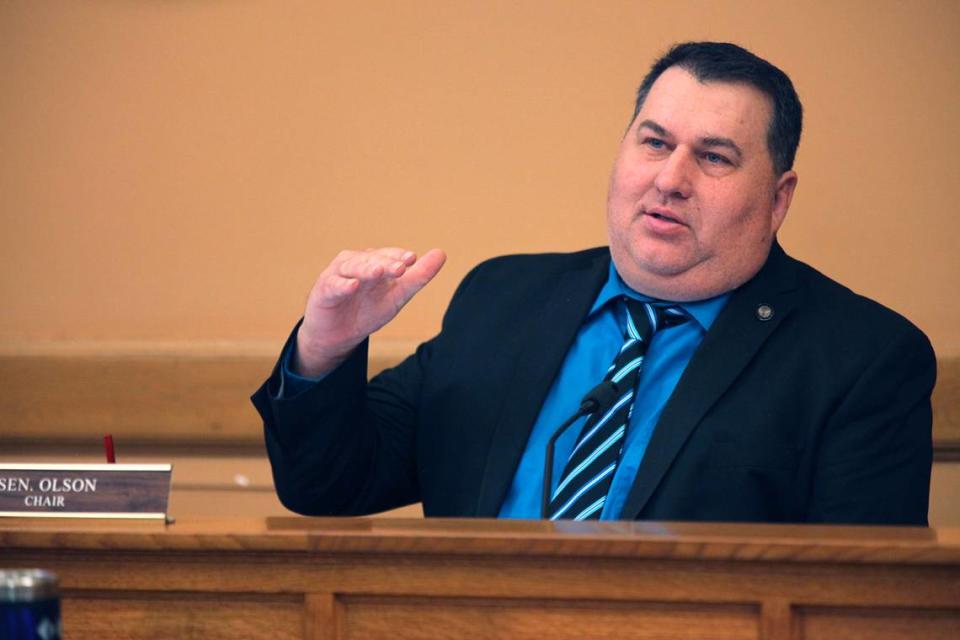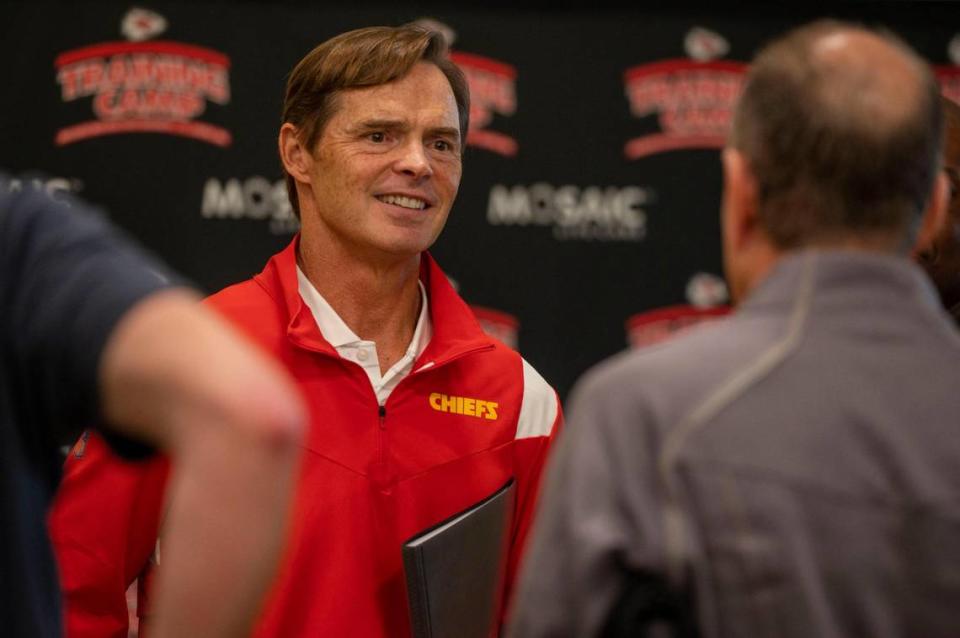Kansas Gov. Kelly open to changing sports gambling fund, as hope of luring Chiefs dims
- Oops!Something went wrong.Please try again later.
- Oops!Something went wrong.Please try again later.
Gov. Laura Kelly isn’t ruling out altering a state fund currently designed to attract the Chiefs or another professional sports team to Kansas after revenues collected from newly legal sports betting have proved relatively modest.
The Democratic governor, coming off a narrow re-election in November, acknowledged some changes to the state’s sports gambling law — including to a sports team fund fueled by betting revenues — are possible.
“We actually are discussing that with all parties at this particular point,” Kelly told The Star. “You know, whenever you pass a bill like that, there will always be sort of unintended consequences.”
In a brief interview, Kelly also sounded confident that the Republican-controlled Legislature would approve immediately ending the state sales tax on food after approving a gradual repeal earlier this year. And the governor said she planned to meet with legislative leaders in her latest attempt to pass Medicaid expansion.
The Star spoke with Kelly in Topeka on Thursday after the Kansas Board of Canvassers officially certified the results of the November general election, in which Kelly defeated Kansas Attorney General Derek Schmidt, a Republican. The board members, who include Kelly, Schmidt and Republican Secretary of State Scott Schwab, voted unanimously to certify the results.
“You’re sure you didn’t transpose the numbers in the governor’s race, right?” Schmidt joked during the meeting. Afterward, Schmidt told reporters he doesn’t yet know what he plans to do after he leaves office in January.
Kelly beat Schmidt after a hard-fought campaign that included the first-term governor touting her role in bringing sports betting to Kansas. Kansas lawmakers approved, and Kelly eagerly signed legal betting into law this spring. The governor then heralded the beginning of betting in September with a visit to Hollywood Casino in Kansas City, Kansas.
Legislators have said the last-minute inclusion of a fund, which receives 80% of revenue the state collects from sports betting, to attract teams to Kansas helped provide necessary votes. The provision also fueled speculation that Kansas would make a serious play to lure the Chiefs away from Arrowhead Stadium and across the state line.
The state budget office has predicted the fund could accumulate $10 million by 2025.
Yet, despite more than $350 million of wagers in the first two months of legal betting, the state has only received just under $271,000 in revenue, according to a report from the Kansas Lottery. That puts the fund on pace, if the trend holds, to fall millions short of the 2025 estimate.
When The New York Times last month published an investigative series on legal sports gambling in the United States, the first story focused on Kansas — detailing the lobbying that went into passage of the bill. The newspaper reported that Homefield LLC, which controls hundreds of acres where a potential future stadium could be located and whose owners include Sporting KC executives, had advocated for inclusion of the fund.
But half a year after the Legislature passed the bill, lawmakers are downplaying the chances of bringing the Chiefs to Kansas — and are expressing openness to changing the fund or eliminating it altogether.
“I think what will happen over the next year or two, it will get redesigned where there’s ... probably eliminate that fund,” said state Sen. Rob Olson, an Olathe Republican who chairs the Senate Federal and State Affairs Committee and championed the sports betting bill.

Olson said he had spoken with Clark Hunt, the Chiefs chairman and CEO, and has come away with the impression that the team is unlikely to move states.
In July, Hunt said publicly that the team hadn’t completed studying the best options for its future when its lease on Arrowhead Stadium expires in January 2031. But Hunt, the team owner, said that his preference is to renovate the stadium in its current location.
The Royals, meanwhile, have made increasingly strong statements about a potential move away from their current stadium next to Arrowhead and to a downtown location.
Chiefs president Mark Donovan acknowledged last month the Chiefs aren’t moving as fast as the Royals in terms of examining a future move, and referenced Arrowhead’s upcoming use in four years as a location for World Cup games. Donovan also said the team is still in the “middle of all the due diligence” and is learning more each day.
“We’ve got more time — we’ve got other things going on with the World Cup in ‘26, in terms of stadium,” Donovan said. “We’re still looking at 2031.”

State Sen. Jeff Pittman, a Leavenworth Democrat, said the provision establishing the fund should be reopened, though he stood by his decision to vote for the bill itself because it was popular among his constituents.
“I call that not a good deal because it’s limiting the ability of the Legislature and Kansans to take advantage of that money and I do think we need to re-look at that this year and say, ‘OK, is that a realistic place to put the money?’” Pittman said.
If the Legislature and Kelly eliminate the fund, one option would be to simply send sports betting revenues into the state’s general fund. Making a change may not be a high priority for lawmakers, however, because Kansas currently has a massive budget surplus. A twice-a-year revenue forecast released last month by state officials projected Kansas would collect total revenues of $10.1 billion in the next fiscal year, about $423.3 million more than the previous forecast last spring.
Kelly indicated discussions are underway about whether to attempt to make changes to the sports betting law next year or wait.
“We may give it a little bit of time to smooth out and see how it all really works,” Kelly said.
Push to end food tax, expand Medicaid
Kelly appears much more intent on quickly eliminating the state sales tax on food.
In the spring, Kelly signed a law that will gradually reduce the rate. She had called for a full and immediate elimination of the tax, but had signed the measure as a compromise achieved with Republicans in an election year.
Kansas currently taxes groceries at a rate of 6.5%. Combined with local sales taxes, Kansas has among the highest tax rates on food of any state.
“I can’t imagine them not doing it, it just doesn’t make any sense,” Kelly said.
State Sen. Tom Hawk, a Manhattan Democrat, has previously predicted lawmakers would have a “bigger appetite” for immediate elimination, given last week’s positive revenue forecast.
But state Sen. Caryn Tyson, a Parker Republican who chairs the Senate Taxation Committee, said last month that she plans to prioritize reducing taxes on retirement benefits, which had been a campaign goal of Schmidt.
Kelly also recommitted to attempting to pass Medicaid expansion, though she offered few details when pressed on how she would break through Republican opposition that has derailed every previous attempt to approve expansion since she took office in 2019.
“We will be meeting with leadership, both the House and Senate side, to figure out how we can get this done,” Kelly said.
Kansas is one of 12 states that hasn’t yet expanded the program. An additional 100,000 Kansans or more would likely receive health coverage from Medicaid if lawmakers approved an expansion.
Kelly promised a “full court press to get this done.”
The Star’s Jesse Newell and Vahe Gregorian contributed to this story.

